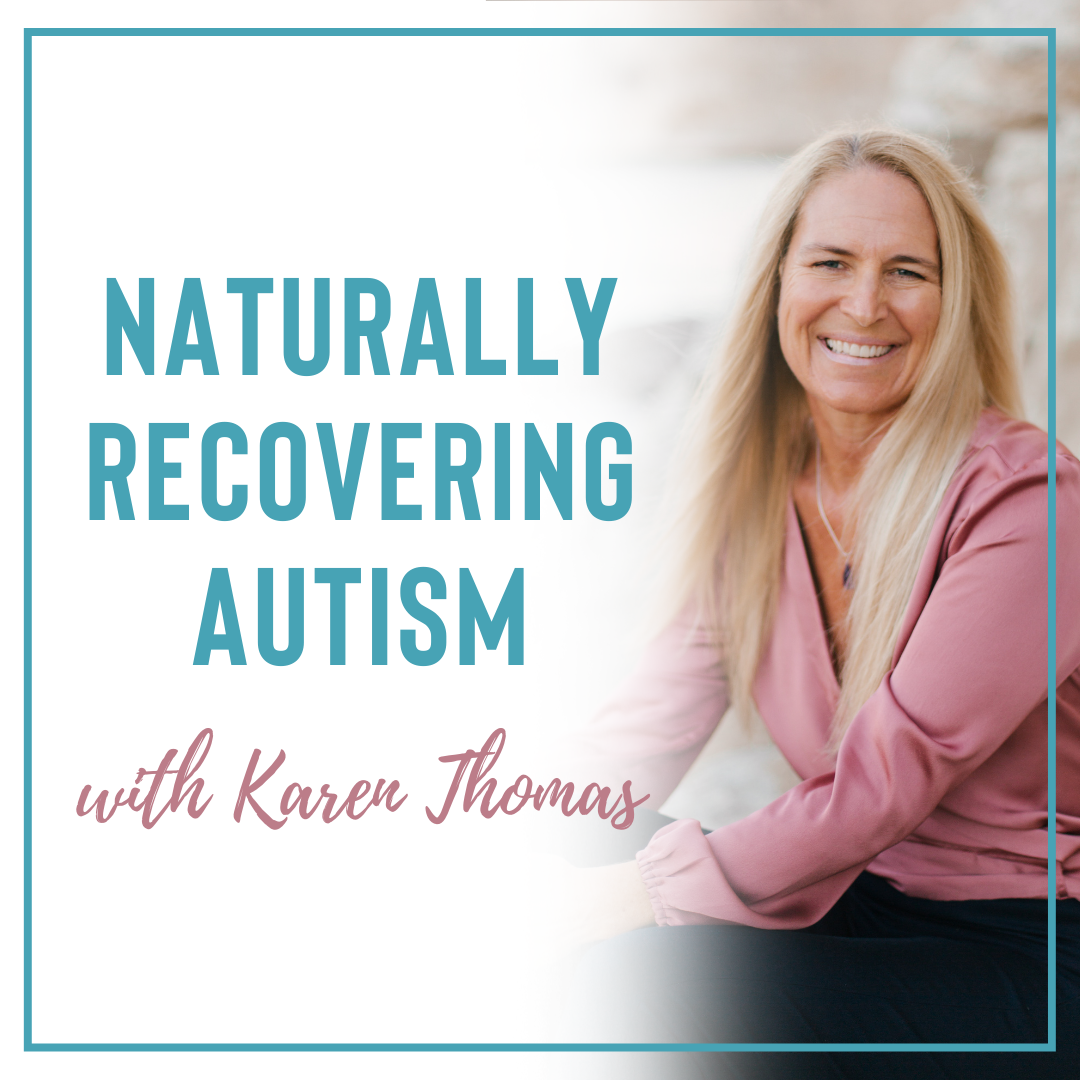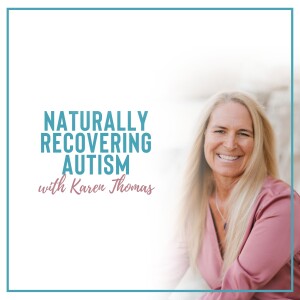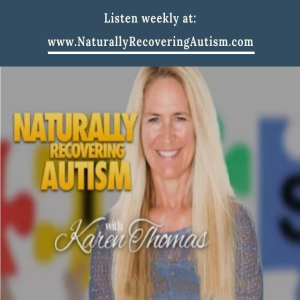

176.4K
Downloads
241
Episodes
Inspiring parents with natural solutions to create the most fulfilling, healthy and productive life possible for their children with autism. Empowering Parents with the Resources to Naturally Recover Autism from a mom who has done it. Having once been told her son could not recover from his symptoms of autism Karen Thomas now shares what she has learned through over a decade of personal research and experience that has brought her own son to recovery. Her background as a Craniosacral Therapist allowed her the awareness that the brain could heal if given the right support. Learn how you can allow your child a clear path for a happier and more fulfilling life with improved communication, better sleep, improved social abilities, and overall improved health. Get your FREE GUIDE to the top 7 foods to eliminate from your child's diet for better sleep, calmer moods, improved focus and speech at, NaturallyRecoveringAutism.com /7foods For more resources go to, NaturallyRecoveringAutism.com
Episodes

Sunday Sep 06, 2020
Autoimmunity PANS and Streptococcal Infections in Autism with Dr. Medeleine
Sunday Sep 06, 2020
Sunday Sep 06, 2020
PANDAS or PANS is an acronym that stands for Pediatric Autoimmune Neuropsychiatric Disorders (Associated with Streptococcal Infections). In 2010, PANDAS became PANS, which is the current proper term for it, so you may hear both.
Autoimmunity is a common problem in autism. In the case of PANS the immune system will attack the brain. It is common when there has been an external stressor in life or an internal one such as an infection that there will be a PANS “flare-up”. This term is used when the infection becomes prominent causing many physical and behavioral issues.
Some symptoms of PANS include, Strep throat, flu-like symptoms, tiks, a reduction in language and speech, aggression, or a sudden onset of OCD, or anxiety. Other infections that are known to trigger PANS can be Lyme disease, and mold biotoxins due to the inflammation.
Proper antibody screening can help to detect PANS. Dr. Madeleine Cunningham has developed a test panel to determine the extent of a PANS infection. In this radio show #79, interview we will discuss autoimmunity, PANDAS and autism. How all of this effects a child (immune system, behaviors, neurotransmitters, etc) and the “Cunningham Panel” for screening.
Medeleine Cunningham, PhD
Madeleine Cunningham, PhD is the George Lynn Cross Research Professor, Department of Microbiology and Immunology, and the Presbyterian Health Foundation Presidential Professor of Microbiology and Immunology and for the past 20 years has been the Director of the NIAID funded Immunology Training Program at the University of Oklahoma Health Sciences Center.
Click Here or Click the link below for more details.
https://naturallyrecoveringautism.com/79

Sunday Sep 06, 2020
At Home Fun To Help Calm Sensory Needs with Lindsey Biel
Sunday Sep 06, 2020
Sunday Sep 06, 2020
During the Coronavirus outbreak there were so many parents at home with their sensory overloaded kids who needed help. One wrote in telling me her child with autism had a PANS/strep outbreak because of the stress of being “shut in” for so long.
We all need outlets for our energy but people with sensory overload need real tools to calm, whereas, some need more stimulation. There was a great need to provide help for parents, so I wanted to share my favorite at-home sensory calming gym with those who need something like it right now.
I also decided it was a perfect time to bring in a sensory processing expert to help further. Please listen to my radio show interview with Lindsey Biel, OTR/L, a pediatric occupational therapist and learn how you can entertain your child at home with fun games that also help calm sensory needs. It’s show #78.

Friday Sep 04, 2020
Friday Sep 04, 2020
Some of the topics we will discuss:
Please listen to my radio show interview with Margaret “Peggy” Glenney. It’s episode #84.
Margaret “Peggy” Glenney MA, CCC-A, F-AA
Margaret “Peggy” Glenney is a developmental audiologist. Since 1984, Margaret Glenney, has worked as an audiologist working in hospitals and universities throughout the U.S, as both an instructor and trainer for the Certified Occupational Hearing Conservationist (COHC), program. She has provided clinical supervision for graduate students in both Speech Pathology and Audiology and taught graduate level courses in Industrial Audiology. Margaret has her teacher’s certification in English 6-12th grade, ELL K-12, and Speech Communication.
Click Here or Click the link below.
https://naturallyrecoveringautism.com/84

Thursday Sep 03, 2020
Thursday Sep 03, 2020
The main three water contaminants
The three common dangerous chemicals added to water
Robert Slovak’s Biography:
Robert Slovak is a degreed Mechanical and Astronautical engineer, best known as the co-founder, with his brother Jack, of Water Factory Systems in the early 1970’s. He is recognized as one of the key developers of Reverse Osmosis (RO) technology and its numerous applications.
Click Here or Click the Link bellow for more details.
https://naturallyrecoveringautism.com/92

Thursday Sep 03, 2020
Water Resources and Autism Sensitivities (Part 1) with Robert Slovak
Thursday Sep 03, 2020
Thursday Sep 03, 2020
Children with autism have greater sensitivities to environmental toxins due to the common issue of poor detoxification and an already compromised immune system. When it comes to achieving safe water, especially for the health compromised the consumer is seriously challenged. There are more than 100 contaminants in drinking water that are too expensive to remove which is why you have to take the reins.
We’re mostly water so drinking water quality is critical. To a lesser degree, water used for bathing and showering is a source of certain contaminants that might be absorbed through the skin and inhaled. Making choices on water treatment products that eliminate most of the threat of water contamination is, UNFORTUNATELY, a hazard in itself.
The typical well-meaning consumer usually approaches me and asks “What water system should I buy for my home?” I want to drop to the floor. To me that’s like walking into a doctor’s office and just asking him, “What meds should I take?” Says internationally known water expert, Robert Slovak. FIRST we have to know something about your water’s physical chemistry.
“Water is not a bit player in the theater of life, it’s the headline act”
Prof Martin Chaplin
The current failure to curtail the Coronavirus can be attributed to mainstream medicine hiding and suppressing the idea of self-immunity enhancement – a simple and effective strategy that will work better than any they’ve implemented. This also means keeping your exposure to inflammatory and toxic compounds to a minimum.
Please listen to my radio show interview with internationally known water expert, Robert Slovak. It’s episode #87.
Robert Slovak’s Biography:
Robert Slovak is a degreed Mechanical and Astronautical engineer, best known as the co-founder, with his brother Jack, of Water Factory Systems in the early 1970’s. He is recognized as one of the key developers of Reverse Osmosis (RO) technology and its numerous applications.
Click Here or Click the Link bellow for more details.
https://naturallyrecoveringautism.com/87

Thursday Aug 27, 2020
Stem Cells and Blood Screening for Coinfections with Dr. Jodie Dashore
Thursday Aug 27, 2020
Thursday Aug 27, 2020
Stem Cells help to regulate the immune system. Their responses shown in blood screening can be indicators of underlying coinfections of autism such as Lyme, mold, and strep. These infections are often undetected in many traditional blood tests, so it’s crucial to know of other markers to look for to determine if treatment should given.
Infection and inflammation in the brain effects cell proliferation, synapse failure, brain development and the balance of neurotransmitters.
In this interview with Dr. Jodie Dashore we will discuss stem cells and the blood screening that can be done to gain insight into the possible coinfections your child may be carrying that can prevent optimum recovery from autism.
Some of the questions we will answer in this interview (Radio show #77):
Overview of different kinds of stem cells
Many parents of kids with ASD are traveling abroad for this procedure. Is this a good idea or not?
Are there any precautions or red flags to look for with any facility offering this procedure?
For kids with ASD who have comorbid issues, Is there a best time to go for stem cells treatment?
Brain imaging can help to scan for imbalances in brain volume. The Neuroquant brain scan is a simple test and often covered by insurance.
Limited time only-Get your FREE ticket to the 2020 Autism One virtual conference here.
Click Here for more details.

Monday Aug 10, 2020
The Function of Neurotransmitters and Their Disruptors
Monday Aug 10, 2020
Monday Aug 10, 2020
Why might my child be behaving this way. Toxins, inflammation on the brain, infections, and gut disruption reduce the production of neurotransmitters.
WHAT IS A NEUROTRANSMITTER?
Neurotransmitters can be thought of as the brain’s messengers. They are chemicals made in the digestive tract, or in the brain. They transmit messages vital to our brain’s ability to function properly, our body’s muscle movements, and more. They regulate our moods, appetite, and sleep. They even control our body’s response to pain. If the volume of these chemicals is too low or too high, the message is not sent properly and we experience symptoms.
Below are a some more commonly known neurotransmitters:
Serotonin
Serotonin is the neurotransmitter most involved in the cause of multiple medical and psychiatric problems. It is greatly affected by inflammation and up to 95% of it is made in the gut, so the gut must be working properly. It mainly affects mood, sleep and appetite.
Low levels of serotonin may contribute to:
- Moodiness, including irritability and depression
- Trouble sleeping
- Appetite control (lack of satiety)
- Night terrors
- Poor digestion
- Migraine headaches
Dopamine
Dopamine is essential in attention, focus, and impulse control. Low dopamine is often a contributor to trouble with handwriting, and ability to organize thoughts or plan future events , extremely low motivation and drive, extreme hyperactivity, motor control, and reward.
Signals that dopamine is low:
- Trouble focusing
- No sense of pleasure or reward
- Inattentive
- Low motivation
- Difficulty with follow through
Too much dopamine can be a problem, just as too little can be a problem. Too much dopamine with phenylalanine can cause behavioral disorders such as schizophrenia and seizures.
Signals that dopamine is too high:
- Hyperfocus
- Stuck in negative behavior patterns (the grudge holder)
Click Here for more details.

Monday Aug 03, 2020
Monday Aug 03, 2020
Children with autism have poor detoxification and need assistance when going through the process. A child with autism is even more sensitive than the average individual. It should be a slow, and gentle process, or when the pathogens die off the behaviors can get extreme and it’s hard on your child’s body too.
There are a lot of supplements out there, so how do you know what to use unless you have a thorough guide through the process. First, let’s talk about how getting rid of pathogens and toxins, slowly, is fundamental, so you understand this process a little better. Then we’ll talk about what supplements help and explain more about them.
I have successfully used these natural elixirs for about a decade now with autism recovery, including my own son’s journey. I have a lot of parents who have told me how valuable they have been for their own child after I shared them. In radio interview #75, with Robert Harrison, we will dive deep into the aspects of pathogens and detoxification for those with autism.
Supporting detoxification and helping calm
Some of the elixirs discussed with Robert Harrison in radio show #75.
Click Here for more details.

Monday Jul 27, 2020
SNP Genes and Autism (Part-2) with Dr. Kendra Becker-Musante
Monday Jul 27, 2020
Monday Jul 27, 2020
Let’s talk about some genetic SNP’s that are associated and supported in recovering autism. Single nucleotide polymorphisms, often referred to as SNPs (pronounced “snips”) are basic genetic variations in people. Respectively, in a DNA sequence. There are thousands of genes associated with AUTISM and all of them have been randomized out in clinical trials which tells us that autism is largely environmental! However, even though our genes do not define us, they can guide our way toward healing.
Genetic susceptibilities come from trauma, both physical, emotional, and from toxic insult. Less than five percent of humans have genetic defects at birth.
Some favorite SNP’s that can be associated and supported in recovering autism:
MTHFR
It is estimated that 98% of people with autism have the MTHFR gene snip. MTHFR or methylenetetrahydrofolate reductase gene (methyl-ene-tetra-hydro-folate-reductase), when working properly, produces the MTHFR enzyme, MTHFR (5,10-methylenetetrahydrofolate reductase). However, if the gene is mutated it will not be able to make important compounds such as protein, and it disrupts the methylation cycle, otherwise known as detoxification. MTHFR gene mutation also disrupts the body’s ability to make the master antioxidant, glutathione. When the body cannot detoxify properly the toxins build up in the body and cause a myriad of health problems. MTHFR is also responsible for creating the process of converting the amino acid homocysteine to methionine. Methionine is the amino acid our body uses to make proteins.
With the MTHFR mutation metabolic issues are common, and so is the deficiency of folate, vitamin Methyl B12 , (vital for proper function of many things including methylation, digestion and food absorption), and pyridoxine (vitamin B6, for brain function and coping with stress), or mutations of related enzymes. Folate is natural and comes from food sources such as green vegetables, beans and other whole plant foods. It is responsible for synthesizing DNA, making red blood cells, transporting oxygen, and supports the functioning of our nervous and cardiovascular systems. Adequate B vitamins, including folate are also necessary for proper cognitive function.
Folic acid is synthetic and commonly in multivitamins and fortified foods. This can cause excess to build in the body. The body has a limited ability to convert folic acid to folate. Too much folic acid can affect gene expression, may reduce immune system function, and exacerbate vitamin B12 deficiency. It is critical to make sure to check your multivitamin, because most will contain folic acid and not folate.
With the MTHFR mutation it is important to reduce inflammatory foods from the diet such as gluten, dairy, processed carbohydrates and sugars. detoxification and the use of toxin binders can be very helpful.
Common health issues related to a disruption in the MTHFR gene are:
- Food allergies
- Inflammation
- Alzheimer’s
- Cardiovascular problems
- ADD/ADHD
- thyroid issues
- Chronic fatigue
- Eczema
- Infertility
- Drug sensitivities
- Tactile sensitivity
A couple of physical signs to look for that refer to MTHFR are:
- A sacral dimple. This would be on the top and center of the gluteal fold.
- A blue line in between the eyebrows.
- Tongue tie
Click Here for more details.

Monday Jul 20, 2020
Monday Jul 20, 2020
What is a retrovirus?
Retroviruses cannot replicate without a host. The difference between a virus and a retrovirus is the retrovirus’ ability to insert its own gene expression into the genes of the host.
Study on retroviruses pseudotyped. Retroviruses pseudotyped with the severe acute respiratory syndrome coronavirus spike protein efficiently infect cells expressing angiotensin-converting enzyme 2. Read the study.
Please listen to my radio show interview with Dr. Judy Mikovits. It’s show # 73.
Click Here for more details.